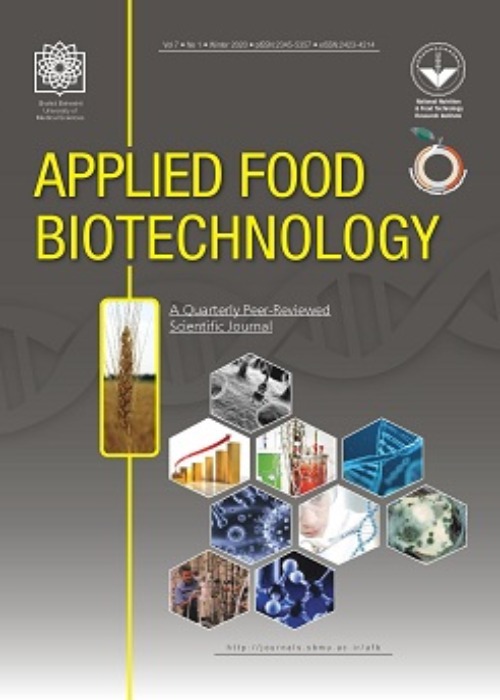Optimization of Protease Production by Psychrotrophic Rheinheimera sp. with Response Surface Methodology
Author(s):
Abstract:
Background And Objectives
Psychrotrophic bacteria can produce enzymes at low temperatures; this provides a wide biotechnological potential, and offers numerous economical advantages over the use of mesophilic bacteria. In this study, extracellular protease production by psychrotrophic Rheinheimera sp. (KM459533) was optimized by the response surface methodology.Materials And Methods
The culture medium was tryptic soy broth containing 1% (w v -1 ) skim milk. First, the effects of variables were independently evaluated on the microbial growth and protease production by one-factor-at-a-time method within the following ranges: incubation time 24-120 h, temperature 15-37°C, pH 6- 11, skim milk concentration 0-2% (w v -1 ), and inoculum size 0.5-3% (v v -1 ). The combinational effects of the four major variable including temperature, pH, skim milk concentration, and inoculum size were then evaluated within 96 h using response surface methodology through 27 experiments.Results and
Conclusion
In one-factor-at-a-time method, high cell density was detected at 72h, 20°C, pH 7, skim milk 2% (w v -1 ), and inoculum size 3% (v v -1 ), and maximum enzyme production (533.74 Uml-1 ) was achieved at 96h, 20°C, pH 9, skim milk 1% (w v -1 ), and inoculum size 3% (v v -1 ). The response surface methodology study showed that pH is the most effective factor in enzyme production, and among the other variables, only temperature had significant interaction with pH and inoculum size. The determination coefficient (R2 =0.9544) and non-significant lack of fit demonstrated correlation between the experimental and predicted values. The optimal conditions predicted by the response surface methodology for protease production were defined as: 22C, pH 8.5, skim milk 1.1% (w v -1 ), and inoculum size 4% (v v -1 ). Protease production under these conditions reached to 567.19 Uml-1 . The use of response surface methodology in this study increased protease production by eight times as compared to the observed before optimization.Keywords:
Language:
English
Published:
Applied Food Biotechnology, Volume:3 Issue: 4, Autumn 2016
Pages:
236 to 245
magiran.com/p1600291
دانلود و مطالعه متن این مقاله با یکی از روشهای زیر امکان پذیر است:
اشتراک شخصی
با عضویت و پرداخت آنلاین حق اشتراک یکساله به مبلغ 1,390,000ريال میتوانید 70 عنوان مطلب دانلود کنید!
اشتراک سازمانی
به کتابخانه دانشگاه یا محل کار خود پیشنهاد کنید تا اشتراک سازمانی این پایگاه را برای دسترسی نامحدود همه کاربران به متن مطالب تهیه نمایند!
توجه!
- حق عضویت دریافتی صرف حمایت از نشریات عضو و نگهداری، تکمیل و توسعه مگیران میشود.
- پرداخت حق اشتراک و دانلود مقالات اجازه بازنشر آن در سایر رسانههای چاپی و دیجیتال را به کاربر نمیدهد.
In order to view content subscription is required
Personal subscription
Subscribe magiran.com for 70 € euros via PayPal and download 70 articles during a year.
Organization subscription
Please contact us to subscribe your university or library for unlimited access!


